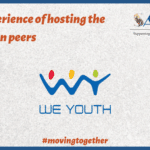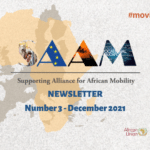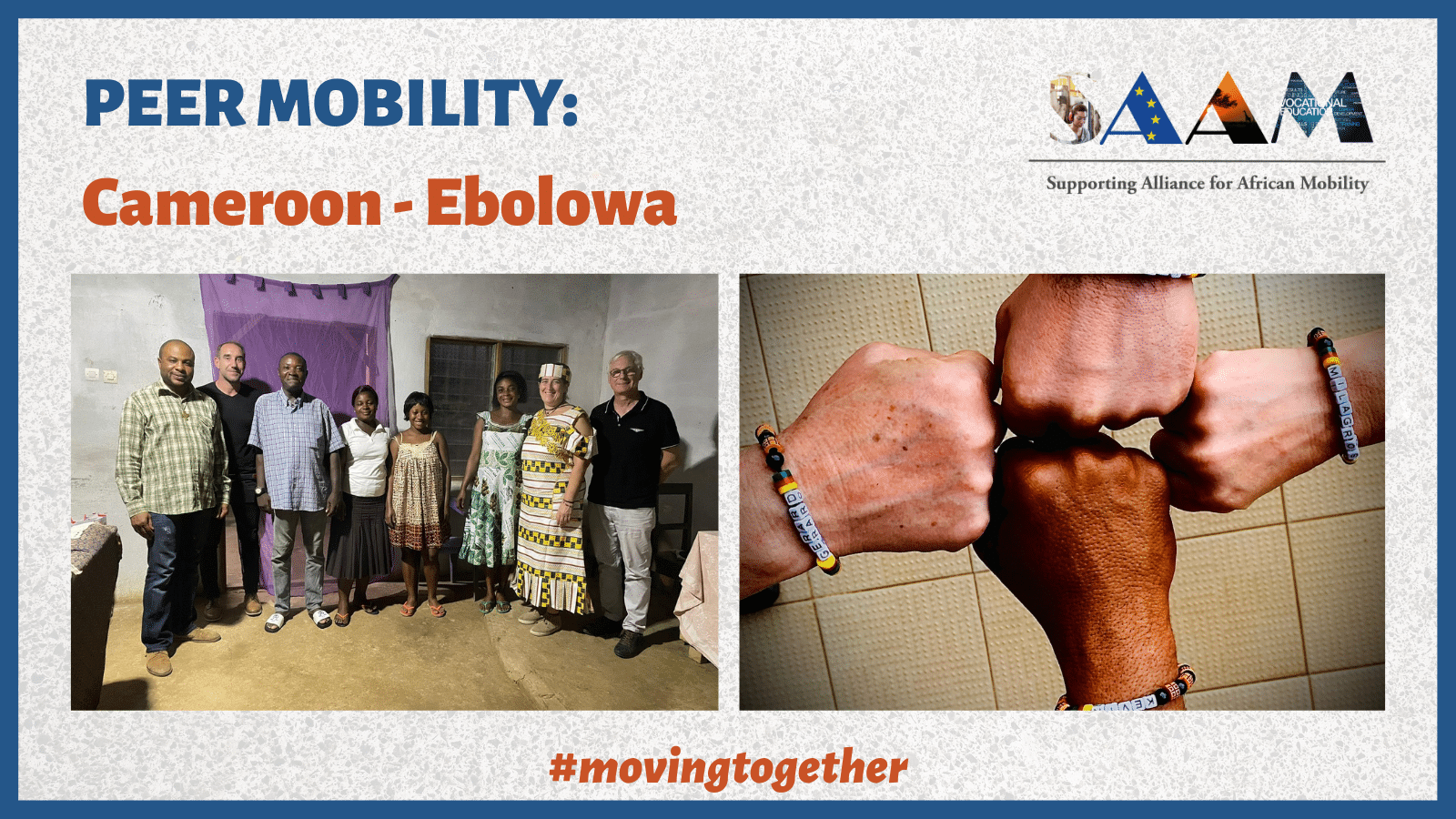32 European VET centers staff members have already visited their peers in Africa!
10/17 of the peer mobilities have already taken place. The peers have been in Cabo Verde, Cameroon (Bare and Ebolowa), Malawi, Liberia, Benin, Kenya, Ivory Coast, Tunisia, Mali and Senegal.
As an example of what this experience means for the peers, the SAAM team has talked to Milagrosa Pérez (C.P.I.F.P. Profesor José Luis Graiño), Gérard Marthouret (SEPR) and Renato Guiomar (Insignare). They visited the Institut Technique Don Bosco Ebolowa center last November and now they tell us how it went.
How did you prepare your mobility?
MILAGROSA – First of all, I went to the web and search information about the place: location of Ebollowa in the South of Cameroun, a bit of its history and culture, the languages talked over there, the music and the typical food. Later on, I went to “Sanidad exterior” to get the vaccinations needed and I contacted the Embassy in Madrid to get the visa.
RENATO – This mobility was prepared with great expectation and commitment. From the beginning of the project we started to prepare every possible step between the entity that I represent – INSIGNARE and SAAM. Online meetings were essential to anticipate some of the situations and promote the success of the trip to Cameron and reach the goals.
GÉRARD – We begin the preparation with three videoconference meetings. The destination was Cameroon and our African partners the Center of formation Don Bosco in Ebolowa. Our Europeans partners were represented by Milagrosa, responsible for the training center CIFP in Seville, Spain, and Renato, responsible for the training center INSIGNARE in Fatima, Portugal. These meetings were good opportunities to discuss and exchange about our cultures, work and expectations from the project. We also had the chance to meet students from Ebolowa to learn more about their current training and expectations. This preliminary work made our first face-to-face meeting smooth and productive.
Define briefly the experience and what it has meant to you.
M – The experience has been a kind of personal growth for me. At the beginning in our first contacts with the place my mind processed it in European terms but once at the school and after sharing with the people over there, my heart took the place of my mind and I realized that we are the same humans being living the same play but in different scenarios.
R – In fact the possibility of going to a country completely different from Portugal is always something impressive. In this specific case I must mention that it was an experience that surpassed in everything the expectations I had. I confess that I had quite high expectations, but they were surpassed. Personally, it was very important, and it allowed me to see some of the basic things differently and how I can try to do more and better for the good of our young people. It was really gratifying and rewarding.
G – This was my first time in Africa! It was obviously a great cultural shock but also a wonderful discovery of great people working on education. They bring to young people a well-defined structure with discipline, diversified education and welcoming accommodation to make them into autonomous citizens. I saw Don Bosco center as an open sanctuary giving all needed tools to build oneself. I note that numerous values advocated by Don Bosco are similar with those of SEPR. I am especially convinced by the necessity to provide the same chances of learning and development to every student.
Has your perspective/opinion about the project changed since the mobility?
M – Yes, it has. Since the mobility I feel the project more challenging than ever but at the same time the experience with our African peers has given me the energy needed to make it possible.
R – Yes. Changed for the better. This project is seen by INSIGNARE as an asset, and the mobility and exchange of experiences with partners made me believe that despite being a pilot project, we can do very important things for the different countries involved and the students.
G – This is a beautiful project and I was already motivated for it. This mobility reinforced my opinion and removed some apprehensions. I am now convinced of the feasibility of such exchange. I think this is an interesting partnership with amazing opportunities for students to learn another culture and know-how.
In a more personal way, how did you feel when you finally met your African peers in real life and not through a computer screen?
M – It has been exciting to see our peers’ smile face to face, to hear their voices without interruptions or any other digital interferences and to breath together in the same atmosphere. All that has created a closer connection between us.
R- I think it was a that feeling that: now yes. We are in Cameroon, with people from here. It’s time to share, meet and experience these people and this country. I must say that they were fantastic in the way they welcomed and accompanied us.
G -I was really happy. Their warm welcoming was even more perceptible face-to-face. We were able to share more about us and this lead to very productive and nice discussions.
What tip would you share with someone who is about to go on a peer mobility?
M – I would remind him or her the slogan of a publicity which says “Be water, my friend”. I mean let’s stay open in every sense, be attentive to everything that happens and let your heart beat with the people that you meet there.
R – This answer is easy. What can I say to colleagues who are about to go on a peer mobility! Just enjoy, become part of the community where you are integrated, don’t be there as tourists. Share, feel, learn everything that these countries offer us and give your best.
G – I would suggest to be very humble and open-minded. There are many things to learn from different cultures and peoples; we just need to open our eyes and ears !
What was the most exciting thing for you?
M – There has been lots of excitement in the experience. If I had to choose, I would keep the kindness of the people and the sounds of Nature in Cameroon.
R – The people, the kindness, the dedication, the friendliness. The genuineness of the people around us.
G – I was really excited to be immersed in the quotidian of Cameroon people without filters or sugarcoating.
Did you find any obstacles (such as the language)?
M – Speaking a foreign language all the time is always some kind of obstacle because although you can understand and speak the language, foreign words are not enough to express all that you want to communicate. Sometimes my mind was disconnected and I pay attention to body language with all my heart.
The support of our peers has been the key in my opinion for the success of the mission, without them everything would have been harder and even nearly impossible. So I cannot add any other obstacles because I guess they have overcome them for us.
R – Despite being a very different country from Portugal, the way i faced the mobility allowed me to easily integrate and develop the work that was proposed. The language, in particular some verb tenses, and more specific words made communication a little slower. But all the participants were sensitive and collaborative.
G – No obstacles to report! We were easily able to speak in French.
How has the mobility helped you for the next phases of the project?
M – After 2 weeks abroad sharing the daily life of our African peers, now I am more aware of the intercultural challenges of the project: not only the language obstacle but also the subtle feelings of missing home flavours. The closeness to our peers’ reality has strengthen my motivation for the successful completion of SAAM pilot project, so let`s go to the following phase¡
R – Yes of course. The main objective of this phase of the mobility was to know the partners, their particularities, limitations and ambitions with SAAM. This mobility help us to know all these objectives. It was an asset for us to move on to the next phase in a coordinated manner and with the potential to be an asset to our partners.
G – The mobility enables a better understanding of the needs in education and training. Potential problems are also more easily predictable. We created good relationships which will facilitate all further interactions. Finally, we have now a more accurate perception of future steps to be discussed remotely (scouting, locations, materials…)
What would you highlight about mobility?
M – I would point out the team spirit created between Cameroon, France, Portugal and Spain. It was our first time together and we were able to share in peaceful harmony the long journeys of travel and to carry out joyfully the duties of the mission.
R- Team work with the Spanish, French and Cameroun partners.
G – I find the current organization efficient so I would not change anything.
What would you highlight about the country?
M – I would highlight the great value of social community there and the enormous generosity of the people that we have met.
R – The people, they are really genuine.
G – It is a wonderful country. I am amazed by the will of people who move forward despite all difficulties.
Did you discover any local traditions (culture, food…)?
M – Yes, we had the chance of sharing dinners with local families and they offered us a great variety of their local gastronomy. We also enjoyed an evening Saturday concert with the different corals of the neighbourhood and we visited several natural and historical places of great interest.
R – Luckily yes. When we make ourselves available to be part of the people and the environment that surrounds us, and not just tourists, we can discover fantastic things that don’t come in the books. Is always very difficult to describe how much it was possible to discover. Every day in Cameroun was a discovery, an adventure. I speak in all aspects, the program and the people are so different that we can discover different flavors, different food, customs, traditions in all days. The elderly, the youth, what the country was like and how it is. it was very enriching indeed.
G – Thanks to our marvellous hosts we discovered many local traditions. The meals taken with our colleagues at restaurant or at home were festive moments where we enjoyed local food specialities. Some of these for memory: Manioc in every shapes, plantain, corn couscous, Ndolé, braised fish, fresh fruits from the tree, porcupine and worms of palm. We visited the center about Cameroon culture and history and a cocoa field, rode dugout canoe in Nbalayo, hiked in forest and saw a very old baobab (“arbre à palabres”).
What kind of activities did you do in the center?
M – Presentation of the project globally to the staff and to the students at “Institute Technique Don Bosco”; job-shadowing at daily workshops and classes at the school; participation in general activities such as “le mot du matin”, sports and cultural recreations and the community celebrations (mas, dinner, party)
R – In the center we had the possibility to be part off several situations. The school had prepared a very diversified activities. During all the days in the mobility we had the chance to be part off classes, be with students and teachers, assist to ateliers, had visit tours, free time, know the city and the people around us. During this days we also visited some families of the students, schools around the city that had also VET courses, companies that the school use to work with to manage the stage off the students, some governmental departments as employment and training and education. I must say that the program was think to teaches us everything about the school, and the country.
G – Immersed in the center life, we shared many activities with our colleagues:
- Participation to courses in different workshops
- Exchanges and discussion with our colleagues (teachers, managers and head masters)
- Visits of companies and meetings with employers
- Meetings with officials (prefect of studies, responsibles of education and employment)
- Interview about our project in a local radio
Describe in a brief way a day in your peer center.
M – 5.30 meditation; 6.00 mass; 6.30 breakfast; 7.15 mot du matin; from 7.30 to 13.00 classes and workshops; 13.30 lunch; from 15 to 18 h classes and workshops; 19.00 dinner.
R – We had the chance to be inside the live within the everyday of the students and teachers. The students and we meet from 7.15 a.m. for the morning speech presented by the Director or an administrative staff or a student. This word is meant to make sense of the day, it is short and tries to convey a message of either a moral or civic nature. Then the students go to the various courses, either theoretical or practical until 12 p.m. and we had the possibility to be part of some of the classes most of the time and talk with students and teachers all the days in Cameron. We found that the students were for the most part motivated and expected a lot from the school also interactions and very strong links between the supervisory and educational staff with the students are very present.
G – 6:00 A.M.: Start of the day. Morning prayer. 7:00 A.M.: Breakfast. 7:15 A.M.: morningword with students. Courses and workshops. Visit of company. 1:00 P.M.: Lunch with colleagues. 2:00 P.M.: Re-start! Visits and discussions. In evening, hang out and dinner in a family.
Has this mobility helped the project to reach more people in that country? (Dissemination…)
M- Yes, it has. We were interviewed twice by the Mvila radio station during the mobility, so all the province where Ebolowa is located was reached. We were received by the provincial delegates of education and employment, so local authorities have been also reached. Furthermore, we visited a public school, so not only the students of our peer, Institute Technique Don Bosco (I.T.D.B.), but also those of that school knows now about SAAM. We have also presented the project directly to 4 families, to 3 of the companies where the students perform their internships and to all the students and teachers of I.T.D.B.
R – Yes. The project was a main objective, but during the mobility we meet so many people and institutions that the project could win, become more complete, more rich. This contacts are also an advantage for future contacts and projects.
G – Yes, I hope so thanks to our visits to different partners and the diffusion in a local radio.
Are you looking forward to the next phases of the project?
M – Yes, I am really looking forward to welcome our African peers in Europe to continue building the African-European bridges projected in SAAM pilot.
R – Yes. I think that now is our responsibility to share our knowledge with the African partner’s. This is just the beginning off a great project, and INSIGNARE is very proud to be part.
G – We work on the accommodation and trip of our African colleagues in France as soon as we come back to France. A videoconference meeting is already planned in January.




